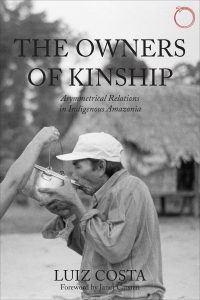Asymmetrical Relations in Indigenous Amazonia
By Luiz Costa
Foreword by Janet Carsten
The Owners of Kinship investigates how kinship in Indigenous Amazonia is derived from the asymmetrical relation between an “owner” and his or her dependents. Through a comprehensive ethnography of the Kanamari, Luiz Costa shows how this relationship is centered around the bond created between the feeder and the fed.
Building on anthropological studies of the acquisition, distribution, and consumption of food and its role in establishing relations of asymmetrical mutuality and kinship, this book breaks theoretical ground for studies in Amazonia and beyond. By investigating how the feeding relation traverses Kanamari society—from the relation between women and the pets they raise, shaman and familiar spirit, mother and child, chiefs and followers, to those between the Brazilian state and the Kanamari—The Owners of Kinship reveals how the mutuality of kinship is determined by the asymmetry of ownership.
A major contribution to anthropological theorizing, this impressive work quietly disposes of many conceptual assumptions abroad in anthropology, less through interrogating Western ideas (via other Western ideas) than through brilliant ethnographic exegesis. The author follows through the consequences of ‘feeding’ as a signature of Amazonian ownership. Observational and analytical sophistication aside, the result offers a kind of scholarly commensality that emphatically enhances the trenchant and radical consequences of the book’s achievement as the body-owner of the arguments it gives us. If Kanamari taught the author this etiquette, we would not do so badly in finding we had a need for it.
— Marilyn Strathern, author of Before and After Gender
Ownership without property, mastery without domination: this is the paradox explored by Luiz Costa in his brilliant analysis of the so-called master-subject bond among the Kanamari. This is a relation that plays a crucial role in indigenous Amazonian cosmopolitics, insofar as it is the primary generative force at work in the world. Beyond its insightful description of Kanamari sociality, this work thus sheds new light on the principles underlying kinship formation and political action in the Lowlands.
— Anne-Christine Taylor, coauthor of Les idées de l’anthropologie
This book is a paradigm shifter. That the distinction between sharing and exchanging (here, commensality and feeding) is as important to the understanding of reciprocity as that between the maternal and paternal descent lines is to the understanding of kinship has long been received knowledge in Melanesia. Unfortunately, due to the influence of Lévi-Strauss, it has been missing from the canon in Amazonia. Thanks to Luiz Costa’s brilliant The Owners of Kinship, this oversight will soon be corrected.
— Roy Wagner, author of The Logic of Invention
Read excerpts from book reviews of The Owners of Kinship
2017
6″ x 9″, 304 pages
ISBN: 9780997367591
$35 paperback
Buy this book from The University of Chicago Press
Contents
by Janet Carsten

The open-access PDF of this book, attached above, is made available by Hau Books through a Creative Commons license BY-NC-ND 4.0 International (Attribution Required / Non-Commercial Use / No Derivatives). Additional rights clearance may be necessary for third-party content within.
BOOK REVIEW EXCERPTS
Review by Michael Cepek in Sociologia e antropologia 10 (3): 1109–13.
Luiz Costa’s The Owners of Kinship: Asymmetrical Relations in Indigenous Amazonia is a major achievement. Incorporating decades of Amazonianist anthropology as its conditions of conceptual and analytical possibility, it stands as a compelling example of a form of scholarship that has become fully realized only in recent years. Costa’s attunement to Amazonian ethnology turns his ethnography of Brazil’s Kanamari people into a transformative engagement with core regionalist theories. It is this centripetal/centrifugal orientation – inward to Kanamari specificities and outward to Amazonia-wide themes – that makes The Owners of Kinship a perfect answer to the question of why Amazonianist anthropology has become one of the discipline’s most unique and inventive subfields. . . .
Costa’s main intervention into the Amazonianist literature is his transformation of Carlos Fausto’s idea of “familiarizing predation”. The phrase refers to the practices of adoptive filiation Amazonians employ to incorporate alterity as a resource for their individual and collective self-production. Costa argues that Fausto is wrong to prioritize warfare and shamanism as the main means of familiarizing enemy capacities. . . . [and] that it is actually the capturing and raising of pets that is the most telling example. . . . Feeding emerges as a way to use asymmetrical means to transform predation into commensality, or “kinship.” . . .
What impressed me most about Costa’s book is how he used the “schema” of feeding as a conceptual key to develop a cumulative understanding of Kanamari culture and history from chapter to chapter. In other words, its structure as well as its argument make The Owners of Kinship a powerful testament to the productivity of the tools it employs. . . .
Ultimately, Costa’s careful yet creative syntheses are what make The Owners of Kinship so easy to appreciate. By putting the Kanamari into open-ended conversation with so many other Amazonians, Costa affirms, transforms, and adds to the conceptual models that regional specialists use to interpret their data.
Review by Steffan Igor Ayora-Diaz, American Ethnologist 46 (4) (2019): 549–50.
This book is a complex ethnographic account of the social, cultural, and linguistic mechanisms that converge in the creation of kinship ties among the Kanamari in the Brazilian Amazon region. . . . For them, kinship is established not through bloodlines but through feeding, which creates ownership and indebtedness. . . .
Among the Kanamari, a newborn is initially considered an alien, an Other that threatens the established kinship group. It is by the process of feeding that the human newborn becomes a person “owned” by the group, implying ownership as both control and protection. . . . Kinship is a map of such relationships of feeding, not a map of consanguinity. In contrast, commensality is the manifestation of horizontal, symmetrical relationships, as all adults who share the meal are accepted as being capable of feeding others.
In other domains as well, the notion of “owner” is primarily though not exclusively constituted through the act of feeding. For example, youth might capture prey that they feed and turn into pets, depriving them of agency. Shamans too feed spirits, thereby subordinating them to their will. In this sense, Costa asserts, agency is not equally distributed. The chief feeds the village both symbolically and materially; hence, he is the owner of the group. . . . The Kanamari imagine history in terms of feeding that divides their past into three stages. . . . Likewise, their sacred myths regarding the jaguar contribute to resignify the meanings of feeding and ownership. Throughout, relationships among people, whether kin or foreigners, and among people and spirits must be understood in the contrasting meanings of feeding as a predatory relationship and commensality as a symmetrical relationship among members of the group. . . .
The Owners of Kinship must be read as an important addition to the ethnographic and linguistic analysis fostered by the relatively recent ontological turn. Costa develops a nuanced, multilayered analysis of the linguistic, social, and semantic processes involved in the creation of kinship groups among the Kanamari and. . . . the anthropological analysis of food, feeding, and commensality.
Review by Łukasz Krokoszyński, Ethnos 85 (4) (2020): 771–73.
[This] ethnography of the Brazilian Kanamari . . . is the first published monograph dedicated to Amazonian relations of ‘ownership’. . . . If anthropologists commonly agree that in Amazonia, ‘kin are made of others’, Luiz Costa postulates a more detailed description of the mechanism employed in this social production. [Such] a mechanism is guided by the relational concept warah (‘body-owner’), which encompasses what English readers understand separately as ‘pet owner’, ‘leader’ and ‘living body’. Along with a careful ethnographic exegesis of such asymmetrical relations, the author develops the argument that the principles structuring the creation of Kanamari ‘kinship’ are drawn from the relational domain indexed as ‘ownership’. In this way, the book innovatively entangles the newer models of ownership with the classic model of conviviality in kinship as developed in anthropological studies of Amazonia. . . .The book presents the ‘mundane’ context of pet keeping as paradigmatic to the model of ownership, where dependence is established by feeding. . . . Importantly, Costa argues that repeated acts of feeding a ‘pet’ by his or her ‘owner’. . . . bring about a commensal intimacy of interdependent equals [and] that pet feeding provides the model for ‘actual’ human filiation and consanguinity. He argues that the . . . consanguineal bond begins with the first act of breast-feeding, which tames the child into intimacy with the mother-owner. Hence, all filiation is ‘adoptive’.
Similarly, local political philosophy reconstructed by Costa postulates the ‘subgroup’ as a function of the dependency on a specific male leader. This enables the cluster of the owner’s dependents to develop horizontal ‘commensality’ as well as symmetrical mutuality with other comparable units. The pattern is replicated currently in relations between the Indigenous group and the Brazilian state. Finally, in Costa’s reading of myths and ritual, the origin of ‘feeding’ relations lies in the transformation of pre-existing, stingy Jaguar figures [into] feeders. . . . The existence of a subgroup relied on a ritual aimed at making such Jaguars (as owners of game animals) feed a cluster of dependents, making them a particular ‘Jaguar’ feeding unit. Through this perspective, ‘ownership’ emerges as a fixed cosmological principle. . . .
This specific rendering of ownership patterns brings attention to the overlap of ‘familiarizing predation’ and ‘conviviality’ models for Amazonia. The book takes an important step in exploring the implications of such convergence for the understanding of both ‘ownership’ and ‘kinship’.
